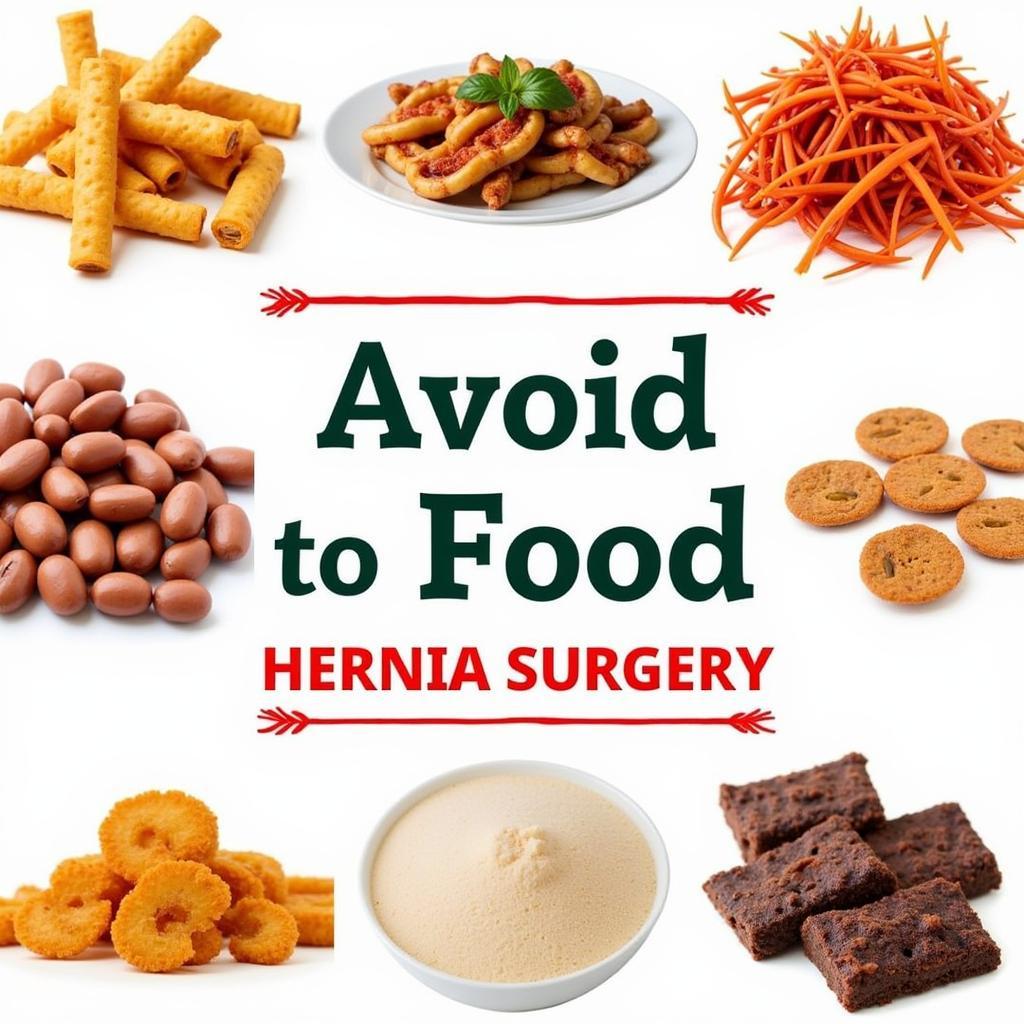After undergoing hernia surgery, your body needs time and the right nutrients to heal properly. While your doctor will provide specific dietary guidelines, there are some foods you should generally avoid during the initial recovery period to minimize discomfort and promote healing. Knowing what not to eat is just as important as knowing what to eat after surgery.
What Foods Should You Avoid After Hernia Surgery?
In the first few weeks after your surgery, your digestive system will still be recovering. Eating certain foods can put extra stress on your abdominal muscles, potentially leading to discomfort, constipation, and other complications.
Here are some of the top Foods To Avoid After Hernia Surgery:
1. High-Fat Foods
Foods high in fat take longer to digest and can slow down your overall digestive process. This can lead to bloating, gas, and constipation – all of which you want to avoid after hernia surgery.
Examples of high-fat foods to avoid:
- Fried foods: French fries, fried chicken, onion rings
- Fast food: Burgers, pizza, tacos
- Fatty meats: Bacon, sausage, salami
- Full-fat dairy products: Whole milk, cream, cheese
- Rich sauces and gravies
2. Spicy Foods
Spicy foods can irritate the digestive tract and may worsen acid reflux, especially if you’ve had a hiatal hernia repair. Avoiding spicy foods can help prevent heartburn, indigestion, and stomach upset.
Examples of spicy foods to avoid:
- Hot peppers: Chili peppers, jalapenos, habaneros
- Spicy sauces: Hot sauce, sriracha, chili oil
- Certain cuisines: Mexican, Thai, Indian dishes known for their spice
3. Gas-Producing Foods
Gas-producing foods can cause bloating and discomfort, putting pressure on your abdomen and potentially affecting your surgical site. Limiting these foods can help minimize discomfort and promote a smoother recovery.
Examples of gas-producing foods to avoid:
- Cruciferous vegetables: Broccoli, cauliflower, cabbage, Brussels sprouts
- Beans and lentils
- Onions and garlic
- Carbonated beverages: Soda, sparkling water
4. High-Fiber Foods
While fiber is an essential part of a healthy diet, high-fiber foods can be difficult to digest, especially after surgery. Eating too much fiber too soon after hernia surgery can lead to constipation and straining, putting pressure on your abdominal muscles.
Examples of high-fiber foods to limit initially:
- Whole grains: Whole wheat bread, brown rice, quinoa
- Raw fruits and vegetables (especially with skins and seeds)
5. Sugary Foods and Drinks
Sugary foods and drinks offer little nutritional value and can contribute to constipation. They can also suppress your immune system, potentially hindering the healing process.
Examples of sugary foods and drinks to avoid:
- Candy
- Sweets and desserts
- Sugary beverages: Soda, juice, sports drinks
 Foods to Avoid After Hernia Surgery
Foods to Avoid After Hernia Surgery
What Can You Eat After Hernia Surgery?
While it’s important to avoid certain foods, there are plenty of nourishing and delicious options you can enjoy after hernia surgery.
Here are some general guidelines:
- Focus on soft, easily digestible foods: Applesauce, mashed potatoes, yogurt, cooked vegetables (without skins)
- Choose lean protein sources: Chicken breast, fish, tofu, eggs
- Stay hydrated: Water is crucial for healing. You can also have clear broth, herbal tea, and diluted juice.
For a more detailed guide on what to eat after hernia surgery, check out our article on what are the best foods to eat after hernia surgery.
Tips for Eating After Hernia Surgery
- Eat smaller, more frequent meals: This can be easier on your digestive system than eating three large meals a day.
- Chew your food thoroughly: This aids digestion and reduces the risk of indigestion.
- Listen to your body: If a food doesn’t feel right or causes discomfort, stop eating it and consult your doctor.
 Tips for Eating After Hernia Surgery
Tips for Eating After Hernia Surgery
When Can You Reintroduce Foods After Hernia Surgery?
As you recover and your digestive system returns to normal, you can gradually reintroduce foods you’ve been avoiding. Start with small portions and see how your body reacts. It’s always best to consult your doctor or a registered dietitian for personalized advice.
Conclusion
Following a hernia surgery diet is crucial for a smooth recovery and to minimize discomfort. While the foods listed above are generally recommended to avoid, it’s essential to follow your surgeon’s specific dietary guidelines. Remember, everyone’s recovery is different, so listen to your body and prioritize your health. If you have any concerns about your diet or experience any unusual symptoms, don’t hesitate to reach out to your healthcare provider.
Remember, these are general guidelines, and it’s essential to consult with your doctor or a registered dietitian for personalized dietary recommendations after hernia surgery.
FAQs About Foods to Avoid After Hernia Surgery
1. How long do I need to follow a special diet after hernia surgery?
The duration of dietary restrictions varies depending on the type of hernia surgery, its complexity, and your overall health. Your surgeon will provide specific guidance on how long to follow a special diet.
2. Can I drink alcohol after hernia surgery?
It’s generally recommended to avoid alcohol during the initial recovery period as it can interfere with healing and interact with pain medications.
3. When can I start eating solid food after hernia surgery?
Your surgeon will likely start you on a liquid diet and then gradually advance to soft, easily digestible foods as you tolerate them.
4. I’m constipated after hernia surgery. What should I do?
Constipation is a common side effect of surgery. Drinking plenty of fluids, eating high-fiber foods (once allowed), and gentle exercise can help. Talk to your doctor if constipation persists.
5. What should I do if I experience pain or discomfort after eating?
Contact your surgeon immediately if you experience severe pain, nausea, vomiting, or other concerning symptoms after eating.
Need more information on post-hernia surgery care? Contact us at Phone Number: 02437655121, Email: minacones@gmail.com, or visit our address at 3PGH+8R9, ĐT70A, thôn Trung, Bắc Từ Liêm, Hà Nội, Việt Nam. Our customer support team is available 24/7 to assist you.